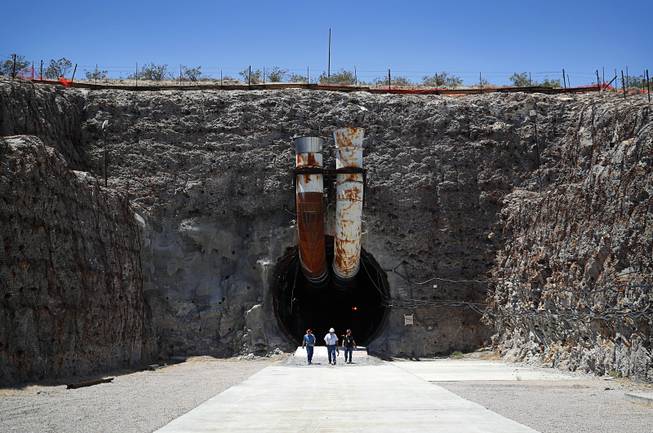
John Locher / AP
In this July 14, 2018, photo, people leave the south portal of Yucca Mountain during a congressional tour near Mercury. Several members of Congress toured the proposed radioactive waste dump 90 miles northwest of Las Vegas.
Thursday, Nov. 7, 2019 | 2 a.m.
Nevada nuclear watchdogs will meet today to discuss the current status the long-term storage of the nation’s radioactive waste
The Nevada Commission on Nuclear Projects will discuss its biennial report on the Yucca Mountain nuclear waste repository and recommendations to the governor and Legislature at 1 p.m. at the Grant Sawyer State Office Building in downtown Las Vegas.
Yucca Mountain, about 90 miles northwest of Las Vegas, was designated as the nation’s only permanent nuclear waste repository in 1987, but the Nevada congressional delegation and state officials have railed against the federal plan for decades. The site is not currently in use.
Bob Halstead, executive director of the state’s Agency for Nuclear Projects, said the state would fight back if any form of licensing on Yucca Mountain starts again.
“If (federal) Nuclear Regulatory Commission licensing resumes, our licensing team intends to win on the facts and the law,” Halstead wrote over email. “The proponents of Yucca Mountain are asking the country to waste another five years and $2 billion on a project that is now obsolete and was unworkable to begin with when the license application was submitted to NRC in 2008.”
The draft report recommends that Nevada’s state and federal lawmakers work to institute the recommendations of the Blue Ribbon Commission on America's Nuclear Future, a group created by then-President Barack Obama to develop alternatives to Yucca Mountain.
“Over the next two years, decisions made by the federal government will have profound implications not only for the Yucca Mountain project and the State of Nevada, but also for the prospects for a successful solution to the nation’s nuclear waste dilemma,” the draft reads.
Based on recommendations from the Blue Ribbon Commission, the draft supports, among other measures, ending the Yucca Mountain project entirely, enacting the Nuclear Waste Informed Consent Act that would create a consent-based storage process, reinstating an annual fee for nuclear power plant operators and instituting a study on alternative ways to get rid of nuclear waste.
“The (Nevada) Commission believes it is time for the country to finally move past the current failed repository program and recognize that Yucca Mountain is, in fact, the single greatest impediment to solving the waste problem, preventing the country from going forward with sound and workable solutions like those recommended by the Blue Ribbon Commission,” the draft reads.
The draft also stresses the need for the state to give Nevada’s attorney general and the Agency for Nuclear Projects enough funding to fight Yucca Mountain development, and proposes that if federal lawmakers take steps to revive the Yucca Mountain program, the governor and the Agency for Nuclear Projects should create a “public information program” to draw attention to the “radiological and social” dangers of transporting the waste into Nevada.
The draft says the Department of Energy and the commercial nuclear industry have created public relations programs to assuage fears of the effects of the repository and the risks of sending nuclear waste across multiple states.
There are multiple federal bills aimed at addressing the repository. Sens. Lisa Murkowski, R-Alaska, Lamar Alexander, R-Tenn., and Dianne Feinstein, D-Calif., have sponsored the Nuclear Waste Administration Act of 2019. This bill would create a consent-based process for the creation of any nuclear waste repository, except in the case of Yucca Mountain.
Members of the Nevada delegation are working to grandfather Yucca Mountain into that bill and have backed the Nuclear Waste Informed Consent Act, which would do the same.
Members of the public will be able to comment at the beginning of the meeting in either the Grant Sawyer State Office Building in Las Vegas or in the state Legislative Building in Carson City.
